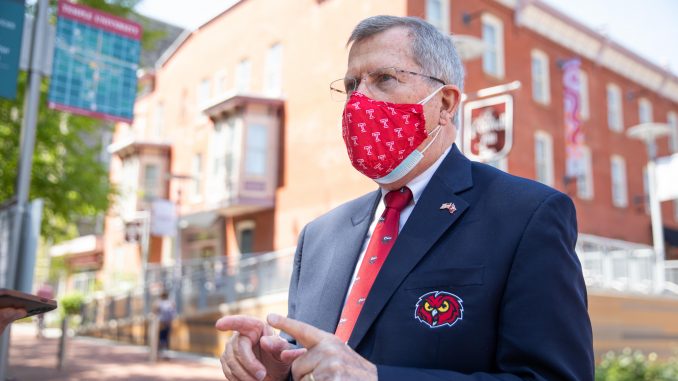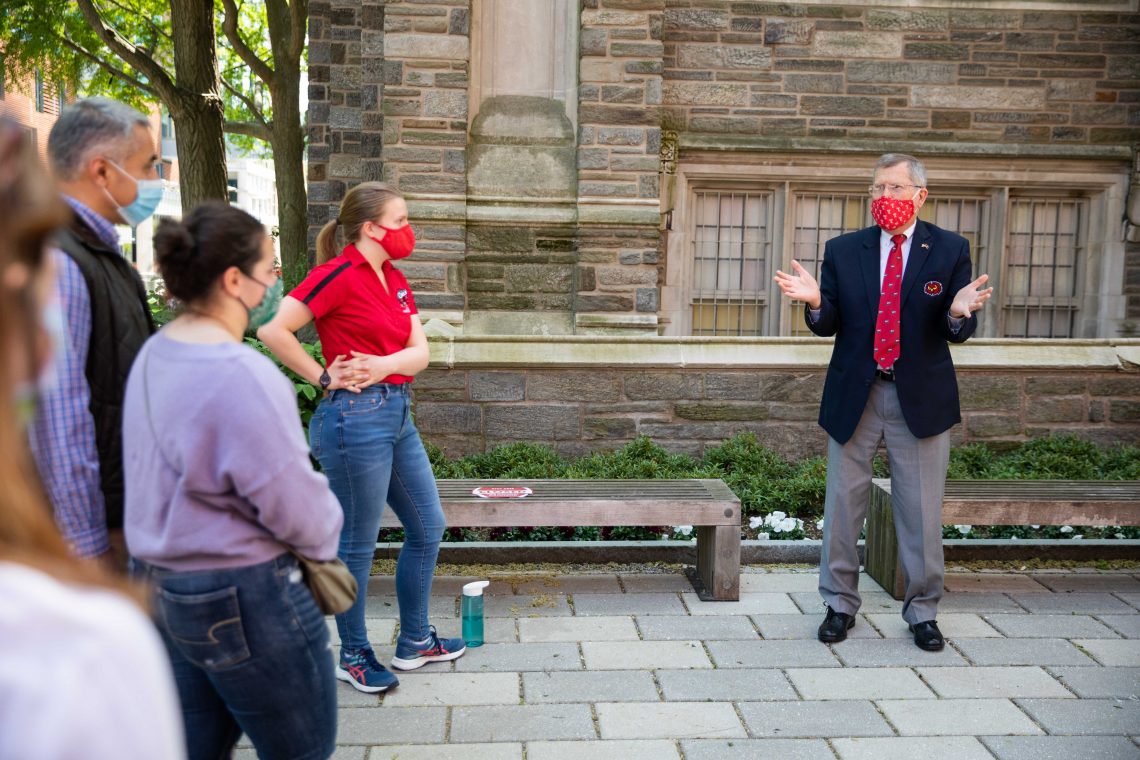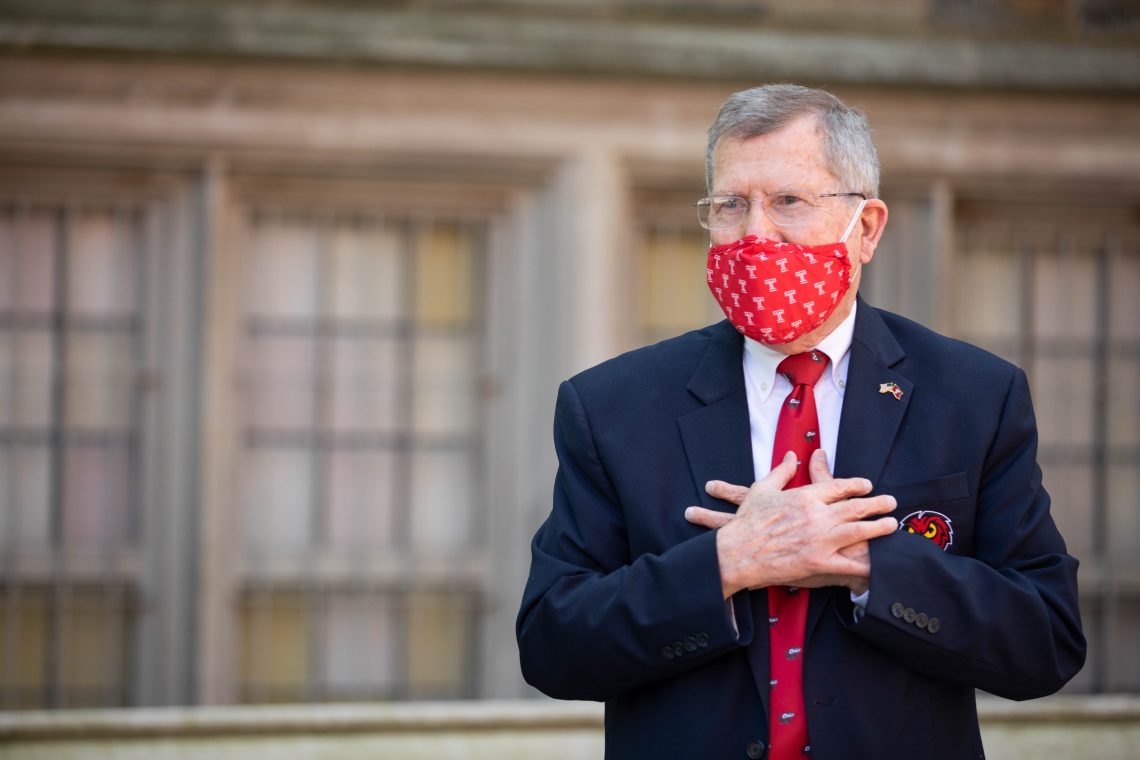
Despite a few colleagues’ disdain, Richard Englert remembers decorating his first classroom with a poster of Malcolm X to instill the values of inclusion and opportunity within his students — second through fourth graders in the special education program of a California elementary school during the 1960s.
“It was a poor area, and it struck me that these kids deserved so much but weren’t getting it,” Englert said. “I developed a real strong sense of social justice and helping those who are most in need, and that’s just always stayed with me.”
Now 75 years old, Englert is beginning a new chapter in his lifelong mission to advocate for fairness and equity in education as he prepares to retire as president of Temple University, a title he never expected to hold but has capped his 45 years in cherry and white.
Temple’s Board of Trustees has yet to select a candidate to succeed Englert as the university’s 12th president.
‘A GOOD MAN AND A GOOD SOUL’
Englert first served as Temple’s president for six months in 2012 after former president Ann Weaver Hart stepped down, The Temple News reported. An interim position, Englert migrated to the office of chancellor in 2013 when the university tapped Neil Theobald as Hart’s successor.
However, when Theobald resigned just a few years later in 2016, the Temple community entered a period of turmoil as the Board of Trustees rushed to both identify Theobald’s successor and investigate the $13-million surge in the deficit of incoming freshmen’s scholarship funds that occurred in the last year of his leadership, The Temple News reported.
Amid the controversy, the Board of Trustees determined that Englert was, once again, the most qualified candidate for interim president because of his wealth of institutional knowledge and selflessness, said Jim Cawley, Temple’s vice president of institutional advancement and a member of the Board of Trustees in 2016.
“The Board almost unanimously, almost instantly said he would be the answer,” Cawley said. “In a short period of time, it became clear that [Englert] was handling the job with such acumen, with such skill, that there was no reason in the world why he shouldn’t be named Temple’s 11th president.”
Englert was officially confirmed as the university’s 11th president in October 2016, and his steady-handed leadership calmed the uneasiness churning within the Temple community, said JoAnne Epps, executive vice president and provost.
“[Englert] took over at a time of great consternation, and what was most desperately needed was stability,” Epps said. “When he was named president, there was a collective sigh of relief and comfort from the institution’s community, recognizing we’d be okay.”
At the onset of his presidency, Englert sought to help the university weather turbulent moments and hoped to elevate Temple’s stature as a premier university and support faculty and students in implementing the university’s mission, he said.
Temple made progress towards each of these goals under Englert’s leadership, he said. Over the past five years, Temple recorded its highest graduation, fundraising and student enrollment rates in its history and received numerous national and international awards, including its first Rhodes and Knight-Hennessy scholars, he added. Englert credits these accomplishments to the teamwork of the Temple community.
“I’m proud that in my five years I’ve been able to do and see that,” Englert said. “It’s a team sport. It’s everybody working together, everybody pulling together and it’s all fulfilling Temple’s mission.”
Every day of Englert’s presidency has looked slightly different, but all have encompassed a mix of experiences like fundraising calls, university events like concerts and athletic competitions, travel and meetings with faculty, staff, alumni, the Board of Trustees and government officials, he said. Meeting and interacting with students is his favorite part of the job, he added.

These experiences have taught Englert a variety of lessons about leadership, like considering others’ viewpoints before making decisions that affect them, and that his job as a leader is not to direct, but to enable, support, encourage, oversee and sometimes protect others, he said.
“He is a great collaborator, and he brings in various viewpoints because he recognizes that different perspectives are necessary in order for us to get to wise decisions,” said Valerie Harrison, senior advisor to the president for equity, diversity and inclusion.
Most recently, Englert relied on his colleagues’ insight when helping to craft Temple’s response to the COVID-19 pandemic, the greatest challenge he has experienced throughout his presidency, he said.
Englert’s commitment to uplifting others’ voices demonstrates his selflessness and strength of character, Harrison said.
“I wish people saw how he struggles to ensure he is leading in a way that preserves his character,” Harrison said. “Many leaders are simply concerned with outcome, not how they lead and the impact of their decisions. [Englert] is just as concerned about how his decisions impact people, about whether they feel motivated, supported and encouraged.”
Englert’s compassion is something his colleagues try to emulate, said Fran Dunphy, acting athletics director and specialist assistant to the president.
“His care quotient is off the chart,” Dunphy said. “I’ve learned from his diligence. I’ve learned from his dedication to this university.”
Englert’s leadership also speaks to the strength of his character beyond his capacity as a university administrator, Epps said.
“He’s a good man and a good soul, and that goodness infuses everything he does,” Epps said. “He doesn’t take things personally. He’s enormously patient. He’s kind. He’s giving. He’s encouraging and supportive of the professional development of his colleagues. He wants the best for them, our university and our students. That’s the approach he takes to life.”
FLYING TO THE TOP
Englert’s career as an educator began in California, first as a public elementary school teacher in South Central Los Angeles and then as a researcher at the University of California Los Angeles for an urban education administration program. His advisor at UCLA, Jay Scribner, was named the dean of Temple’s College of Education and Human Development in 1975, and he asked Englert to accompany him as an assistant.
Englert barely knew anything about Temple when he arrived in 1976, he said.
“Campus looked very different back then,” Englert said. “But I became very impressed with the College of Education [and Human Development] and its commitment to helping kids in city schools.”

Within his first decade at Temple, Englert climbed up the administrative ladder to three other roles before settling down as the dean of the College of Education and Human Development in 1986, a position he held until 1991. During this time, he taught educational administration classes within the college as well.
“He’s a great teacher and his knowledge of higher education as a discipline is incredible,” said Jodi Laufgraben, Temple’s vice provost for academic affairs, assessment and institutional research who had Englert as a professor and dissertation advisor in 1990. “He puts his students first always, and his commitment to his students and his passion for higher education came through in the classroom the same way it comes through when he walks across campus as president.”

Englert continued rising to higher administrative positions throughout the 1990s, jumping from a position as associate vice president for administration to interim positions in various schools and colleges on Temple’s Main and Health Sciences Campuses. Englert also had a three-month stint as Temple’s acting athletic director in 1996 at the request of former president Peter Liacouras, which was the job his two sons were most excited about, he said.
Englert entered the 2000s serving as the vice president for administration, during which time he experienced another one of the greatest challenges of his career: the terrorist attacks on Sept. 11, 2001. As the nation grieved, Englert sought to support students, particularly those who had family from places that were attacked, by working with the university’s police department to make campus safer, he said.

After navigating through this challenge, Englert soared higher through Temple’s administration, becoming the the provost and interim senior vice president for academic affairs in 2010 before ultimately being named acting president of the university for the first time in July 2012.
With 45 years of experience under his belt, Englert’s tenure at Temple extends longer than the university’s founder, Russell Conwell.

Englert announced his plans to retire by the end of the 2020-21 academic year during a conference call that took place after the July 2020 Board of Trustees meeting, The Temple News reported.
“I knew that in December [2020], I was going to turn 75,” Englert said. “And I said ‘45 years, 75 years old, I owe my wife more time with her.’ And my wife says it can’t come soon enough.”
Englert’s dedication to his family is one of few things that rival his commitment to the university, Epps said. Epps recalls first meeting Englert at a Temple University men’s basketball game around the time the Liacouras Center first opened in 1997 because their families had season tickets next to one another.
“It’s important for people to know his devotion to his family,” Epps said. “I remember all of the times I got to meet his sons at those games, and I greet them warmly now even decades later. And his wife is delightful. She’s equally a good person and she explains a lot about [Englert].”
Englert will continue to serve as president of the university until the Board of Trustees selects his successor. The Board convened the Presidential Search Committee in September 2020 to begin identifying potential candidates, and collected feedback from the Temple community about the decision through nine virtual town halls and a survey, The Temple News reported.
The Presidential Search Committee intends to recommend a candidate for Englert’s successor to the Board of Trustees in the coming weeks, The Temple News reported.
Englert hopes the university’s next president is someone who is passionately committed to Temple’s mission and cares deeply about making the university even better than it is now, he said.

During retirement, Englert hopes to return to teaching general education courses at Temple, one of the greatest things he’s missed during his time as president, he said.
Temple has begun honoring Englert’s accomplishments and contributions to the university by creating a scholarship intended for students with financial need in the College of Education and Human Development, particularly students studying special education. Englert requested the scholarship be named the “Otto and Della Englert Scholarship” in honor of his parents, Cawley said.
“He’s said on numerous occasions that some of his happiest moments at Temple University have been in the classroom, so to him, this is the most special way to be recognized by the greater university community,” Cawley said.
As he prepares to enter the newest chapter of his time at Temple, Englert hopes to be remembered as someone who helped the university stay true to its founding principles while adjusting to the challenges of a rapidly changing world, he said.
“It’s bittersweet because I love doing this, but I also realize that I’ve had a great opportunity and a great career,” Englert said. “I’m just so proud of what we do every day and all of the individuals who have accomplished so much.”


Be the first to comment